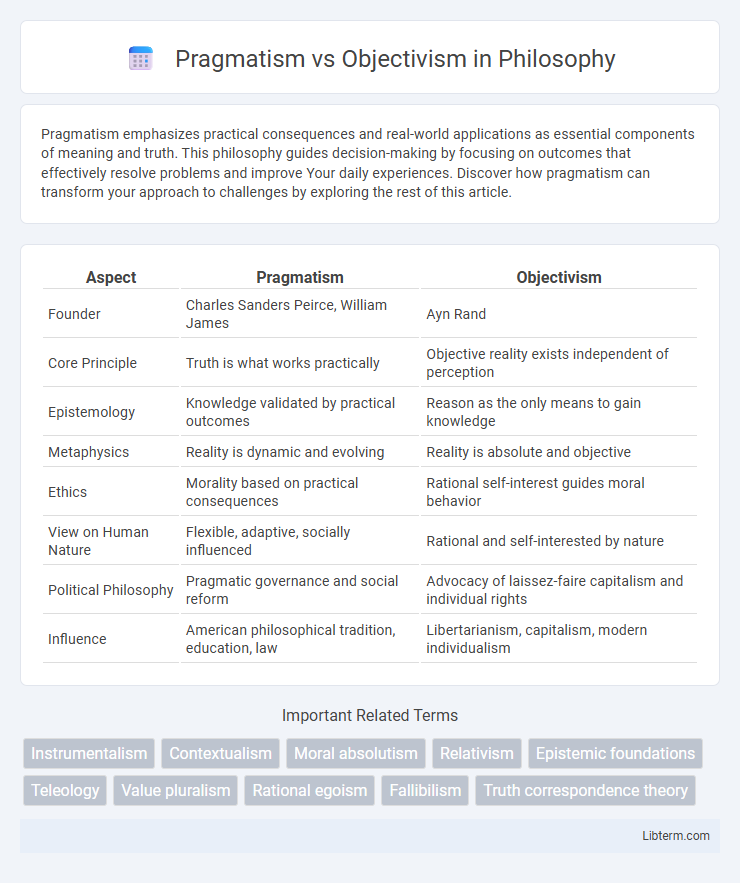Pragmatism emphasizes practical consequences and real-world applications as essential components of meaning and truth. This philosophy guides decision-making by focusing on outcomes that effectively resolve problems and improve Your daily experiences. Discover how pragmatism can transform your approach to challenges by exploring the rest of this article.
Table of Comparison
| Aspect | Pragmatism | Objectivism |
|---|---|---|
| Founder | Charles Sanders Peirce, William James | Ayn Rand |
| Core Principle | Truth is what works practically | Objective reality exists independent of perception |
| Epistemology | Knowledge validated by practical outcomes | Reason as the only means to gain knowledge |
| Metaphysics | Reality is dynamic and evolving | Reality is absolute and objective |
| Ethics | Morality based on practical consequences | Rational self-interest guides moral behavior |
| View on Human Nature | Flexible, adaptive, socially influenced | Rational and self-interested by nature |
| Political Philosophy | Pragmatic governance and social reform | Advocacy of laissez-faire capitalism and individual rights |
| Influence | American philosophical tradition, education, law | Libertarianism, capitalism, modern individualism |
Defining Pragmatism: Key Principles
Pragmatism centers on practical consequences and real-world applications as the core criteria for assessing truth and meaning. It emphasizes the role of human experience, action, and adaptability in shaping beliefs, viewing ideas as tools for problem-solving rather than fixed absolutes. Key principles include the belief that knowledge evolves through inquiry and that concepts gain validity through their utility and effectiveness in addressing specific situations.
Understanding Objectivism: Foundational Concepts
Objectivism, founded by Ayn Rand, emphasizes rational self-interest, objective reality, and individual rights as its foundational concepts. It posits that reality exists independently of consciousness, and knowledge is obtained through reason and logical analysis. Ethics in Objectivism advocate for pursuing one's own happiness as the highest moral purpose, contrasting sharply with pragmatism's flexible, outcome-based approach.
Historical Roots of Pragmatism and Objectivism
Pragmatism, emerging in the late 19th century with philosophers like Charles Sanders Peirce, William James, and John Dewey, roots itself in the practical consequences of belief and the adaptability of truth through experience. Objectivism, developed by Ayn Rand in the mid-20th century, grounds itself in a metaphysical reality, advocating reason, individualism, and objective reality as the basis for knowledge and ethics. The historical divergence highlights pragmatism's focus on the evolving and functional nature of truth, contrasting with objectivism's commitment to unchanging, absolute principles.
Core Differences Between Pragmatism and Objectivism
Pragmatism emphasizes the practical consequences and usefulness of beliefs as the core criterion for truth, while Objectivism asserts that reality exists independent of consciousness and that reason is the only means of gaining knowledge. Pragmatism is flexible, allowing truth to evolve with new experiences, whereas Objectivism upholds absolute truths based on objective reality and rationality. The fundamental difference lies in Pragmatism's focus on outcomes and adaptability versus Objectivism's commitment to fixed, objective principles.
How Pragmatists Approach Truth and Reality
Pragmatists approach truth and reality by emphasizing practical consequences and experiential outcomes as the criteria for validity, viewing truth as dynamic and contingent upon usefulness in real-world situations. They reject absolute or fixed notions of truth, believing that concepts and beliefs evolve through continuous interaction with the environment and problem-solving processes. This pragmatic stance contrasts with Objectivism's commitment to objective reality and unchanging truths that exist independently of human perceptions.
The Objectivist Perspective on Knowledge
The Objectivist perspective on knowledge emphasizes that reality exists independently of consciousness and that humans gain objective knowledge through reason and sensory experience. This philosophy asserts that concepts must be logically derived from perceptual evidence, and knowledge is both absolute and discoverable rather than fluid or subjective. Objectivism rejects relativism by maintaining that facts are facts, regardless of beliefs or feelings.
Ethical Implications of Pragmatism vs. Objectivism
Pragmatism emphasizes ethical flexibility, promoting moral decisions based on practical consequences and contextual outcomes, which allows adaptability in complex social scenarios. Objectivism, founded by Ayn Rand, advocates for absolute ethical principles based on rational self-interest and objective reality, prioritizing individual rights and integrity. The ethical implications highlight pragmatism's focus on collective benefits and evolving norms, contrasting with objectivism's unwavering commitment to objective moral truths and personal responsibility.
Pragmatism and Objectivism in Decision-Making
Pragmatism in decision-making emphasizes practical outcomes and adapts strategies based on real-world effects and experiential learning, prioritizing flexibility and context. Objectivism, rooted in rational self-interest and objective reality, advocates for decisions grounded in reason, factual evidence, and moral principles that ensure individual rights and long-term consistency. Both frameworks influence decisions profoundly: Pragmatism adjusts dynamically to changing circumstances, while Objectivism upholds a steadfast commitment to rational truths and ethical consistency.
Influence on Modern Thought and Society
Pragmatism, championed by thinkers like William James and John Dewey, emphasizes practical consequences and experiential learning, profoundly shaping modern education and democratic governance by promoting adaptive problem-solving and pluralism. Objectivism, founded by Ayn Rand, prioritizes rational self-interest and objective reality, influencing libertarian political theory and capitalist economic principles through its advocacy for individual rights and laissez-faire policies. Both philosophies continue to impact contemporary debates on ethics, politics, and epistemology by contrasting collective utility against individual autonomy.
Which Philosophy Resonates Today?
Pragmatism emphasizes practical outcomes and adaptive thinking, making it relevant in dynamic, problem-solving contexts such as technology and policy-making. Objectivism, advocating for rational self-interest and absolute truths, appeals to those valuing individualism and objective reality. In today's complex world, pragmatism often resonates more widely due to its flexibility and focus on real-world results.
Pragmatism Infographic

 libterm.com
libterm.com